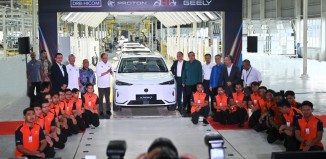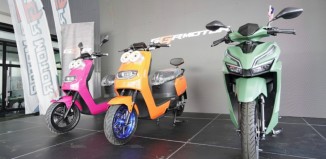BMW i3 Now Available In Malaysia
 BMW Malaysia first introduced the BMW i3s in April 2019 at the Malaysia Autoshow. The BMW i3s is priced at RM278,800 (on the road, without insurance, and with BMW Group Malaysia’s latest 5 Years Unlimited Mileage Warranty, Free Scheduled Service Programme and BMW Tyre Warranty Programme).
BMW Malaysia first introduced the BMW i3s in April 2019 at the Malaysia Autoshow. The BMW i3s is priced at RM278,800 (on the road, without insurance, and with BMW Group Malaysia’s latest 5 Years Unlimited Mileage Warranty, Free Scheduled Service Programme and BMW Tyre Warranty Programme).
Owners of the first-ever BMW i3s will experience the complete BMW Group Malaysia Premium Ownership experience which includes:
- BMW 5-Year Unlimited Mileage Warranty with Free Scheduled Service Program
- BMW 2-Year / 24-Month Tyre Warranty Program for its Run Flat Tyre offering and services
- BMW Roadside Assistance and Accident Hotline
- The BMW Group Loyalty+ Mobile App – BMW White Card
- BMW Service Online
In that article linked above, we had covered the technical specifications of the i3s, so in this one we delve a bit more into the sustainability efforts of the BMW Group by looking at how it developed and produced the i3.
 The BMW i brand has set out to create sustainable luxury for the environmentally conscious, which has culminated in the first-ever BMW i3s – a car designed from concept to production to incorporate natural, renewable resources and upcycled materials.
The BMW i brand has set out to create sustainable luxury for the environmentally conscious, which has culminated in the first-ever BMW i3s – a car designed from concept to production to incorporate natural, renewable resources and upcycled materials.
Beyond just generating zero local emissions, driving the BMW i3s means driving with a clear conscience, knowing that even before production begins, the BMW i3s was designed to ensure a consistent quota of 95% recyclability, especially for the non-renewable aluminium and copper used.
 The BMW Group’s holistic view of premium electro-mobility means the i3s has interior surfaces made from over 80% renewable, natural and recycled materials. The instrument panel features beautiful open-pored eucalyptus wood that is grown and source responsibly. Its moisture-resistant surface means it requires 90% less surface processing than conventional wood. In 2013, the BMW Group became the first automotive manufacturer to use eucalyptus wood from 100% certified responsible forestry management.
The BMW Group’s holistic view of premium electro-mobility means the i3s has interior surfaces made from over 80% renewable, natural and recycled materials. The instrument panel features beautiful open-pored eucalyptus wood that is grown and source responsibly. Its moisture-resistant surface means it requires 90% less surface processing than conventional wood. In 2013, the BMW Group became the first automotive manufacturer to use eucalyptus wood from 100% certified responsible forestry management.
 Additionally, the door lining and instrument panel cover of the vehicles which are typically made from petroleum-based plastics, are instead made with the strong fibres of the Kenaf plant that are similar to jute or hemp. The Kenaf is indigenous to southern Asia and belongs to the mallow family that transforms an exceptional amount of carbon dioxide into oxygen during its growing phase. The fibres not only help reduce vehicle weight significantly, its attractive structure also removes the need for lamination, further enhancing the sustainability factor of the BMW i3s’ design. With the help of development agency Deutsche Gesellschaft für internationale Zusammernarbeit, the BMW Group has trained almost 1,000 local Kenaf farmers to ensure sustainable cultivation of this natural material.
Additionally, the door lining and instrument panel cover of the vehicles which are typically made from petroleum-based plastics, are instead made with the strong fibres of the Kenaf plant that are similar to jute or hemp. The Kenaf is indigenous to southern Asia and belongs to the mallow family that transforms an exceptional amount of carbon dioxide into oxygen during its growing phase. The fibres not only help reduce vehicle weight significantly, its attractive structure also removes the need for lamination, further enhancing the sustainability factor of the BMW i3s’ design. With the help of development agency Deutsche Gesellschaft für internationale Zusammernarbeit, the BMW Group has trained almost 1,000 local Kenaf farmers to ensure sustainable cultivation of this natural material.
 The BMW i3s’ car seats are of naturally-tanned leather with olive leaf extract. The olive leaves are responsibly-sourced from the by-product of olive harvests in the south of Europe, thus preventing a large-scale waste of natural ingredients. The gently-tanned raw leather results in a supple finish that provides a fresh scent to the seats, regulating both moisture and temperature to enhance driving comfort.
The BMW i3s’ car seats are of naturally-tanned leather with olive leaf extract. The olive leaves are responsibly-sourced from the by-product of olive harvests in the south of Europe, thus preventing a large-scale waste of natural ingredients. The gently-tanned raw leather results in a supple finish that provides a fresh scent to the seats, regulating both moisture and temperature to enhance driving comfort.
 Further, the interior of the i3s is clothed in 100% recycled polyester that is spun into fabric. The upcycled material, 34% of which is sourced from PET bottles, undergo an innovative process of melting down PET pellets to produce fabric that is not only highly durable but is pleasant to the touch and appealing to the eyes. This material is used to make the seat covers, floor linings, roof liners as well as foot mats, replacing up to 25% of the thermoplastic synthetic materials found in conventional vehicles.
Further, the interior of the i3s is clothed in 100% recycled polyester that is spun into fabric. The upcycled material, 34% of which is sourced from PET bottles, undergo an innovative process of melting down PET pellets to produce fabric that is not only highly durable but is pleasant to the touch and appealing to the eyes. This material is used to make the seat covers, floor linings, roof liners as well as foot mats, replacing up to 25% of the thermoplastic synthetic materials found in conventional vehicles.
 At the end of their lifespan, much of the BMW i3s can be recycled to better regulate its use of natural resources, while ensuring less environmental and economic waste. The BMW Recycling and Dismantling Centre (RDC) in Munich recycles more than 7,500 vehicles a year, setting a clear example within the automotive industry.
At the end of their lifespan, much of the BMW i3s can be recycled to better regulate its use of natural resources, while ensuring less environmental and economic waste. The BMW Recycling and Dismantling Centre (RDC) in Munich recycles more than 7,500 vehicles a year, setting a clear example within the automotive industry.
 Apart from examining new recycling concepts, the RDC also works with research institutes to develop better recycling technologies. The brand that is BMW i will continue to pave the way forward for sustainability in electrified vehicles of the premium segment, from production to disassembly, to keep the industry thriving without contributing to the environmental damage caused by modernisation.
Apart from examining new recycling concepts, the RDC also works with research institutes to develop better recycling technologies. The brand that is BMW i will continue to pave the way forward for sustainability in electrified vehicles of the premium segment, from production to disassembly, to keep the industry thriving without contributing to the environmental damage caused by modernisation.


























